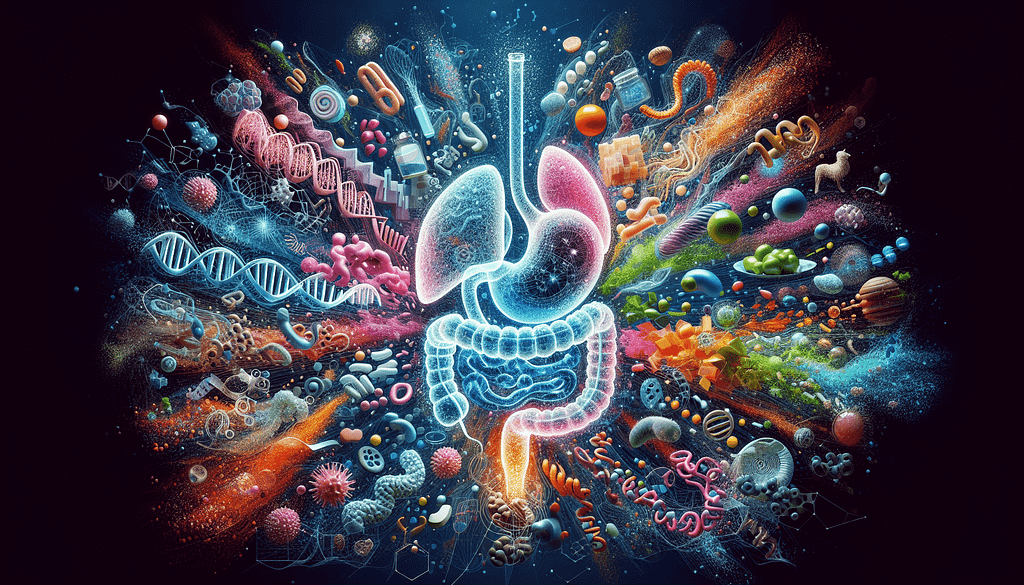Imagine having the power to effectively break down your food, maximize nutrient absorption, and bid goodbye to pesky digestive woes like bloating and gas. The good news? This power is already within your reach, thanks to digestive enzymes! This article offers a comprehensive guide on the best supplements for boosting these clever bio-compounds that turn your food into fuel. It details the essential roles of protease, lipase, and amylase in digestion, and how to naturally enhance their performance. You’ll also discover signs of enzyme deficiency and effective strategies to combat it, plus an exploration of different types of enzyme supplements and their unique benefits. Timer to harness the full potential of your digestive system – let’s get started!
When it comes to the upkeep of your digestive health, it’s crucial to get the right balance of enzymes to ensure everything is working to its best capabilities. Different enzymes play specific roles in breaking down the foods you eat, but the top contenders include protease, lipase, and amylase enzymes. Additionally, multi-enzyme complexes offer a comprehensive array of enzymes in one. Regardless of your drinks or dietary preferences, there’s an option for you on this list.
The first stars of the show are your protease enzymes. As the name suggests, these are the enzymes responsible for breaking down proteins in the body. They ensure that your body can effectively absorb and use the essential building blocks, or amino acids, from the proteins you consume.
Next up, we have the lipase enzymes. These enzymes focus on the breakdown of fats in your meals. By helping your body to turn fats into glycerol and fatty acids, lipase enzymes allow you to absorb and use these vital nutrients.
Rounding out our trio are the amylase enzymes. As the primary enzymes involved in breaking down carbohydrates, they make sure your body can absorb and use the energy from your meals efficiently.
Finally, if you’re someone who prefers to cover all bases at once, multi-enzyme complex supplements are for you. These complexes contain a blend of different enzymes, including protease, lipase, and amylase, providing an all-in-one solution to your digestive needs.
Protease enzymes have the primary function of breaking down dietary proteins into their individual amino acids. This process supports your body’s repair, growth, and maintenance processes.
The benefits of protease enzymes cannot be overstated, particularly for people who consume a lot of protein in their diet. They can help with protein digestion and reduce symptoms like bloating and indigestion.
For those getting their proteases the old-fashioned way, food sources of these enzymes include items like pineapples and papayas.
While recommended dosages of protease enzymes vary, a typical supplemental dose ranges between 200-500 milligrams per day.

Lipase enzymes play an essential role in the digestion and absorption of dietary fats. These enzymes break down fats into fatty acids and glycerol, two compounds that your body uses for energy and cellular functions.
Natural sources of lipase enzymes include many fruits and vegetables, nuts, and seeds. However, for those needing an extra intake, lipase enzyme supplements are available and could prove beneficial to those with certain conditions or those who consume a high-fat diet.
The recommended dosage for lipase enzymes varies, but a typical supplemental dose is around 250-500 milligrams per day.
Amylase enzymes are mainly tasked with breaking down complex carbohydrates into simple sugars. They initiation the first step of carbohydrate digestion in our mouths and continue to work their magic in our stomachs and intestines, providing us with the energy we need to get through the day.
Food sources rich in amylase enzymes include bananas, potatoes, honey, and various grains.
The optimum dosage for amylase enzymes depends on several factors, including your dietary habits and overall health. However, a typical supplemental dose ranges from 50 to 150 milligrams per day.

Bloating can be caused by various factors, but a common cause is undigested food in the stomach and intestines. Digestive enzymes can help alleviate bloating by speeding up the breakdown and absorption of food, reducing the chance that it will ferment and produce gas in your gut.
Different enzymes might be more effective for different types of bloating based on their ability to break down proteins (protease), fats (lipase), or carbohydrates (amylase).
The dosage and timing for bloating relief will depend on the particular supplement but always remember to consult with a health professional before starting any new supplement regimen.
Digestive enzyme supplements help in various areas, like improving nutrient absorption. By breaking down food into its smallest components, your body can effectively absorb and use these nutrients.
In addition to improved absorption, these supplements help reduce gastrointestinal symptoms such as bloating, indigestion, and irregular bowel movements.
Most importantly, digestive enzymes are essential for the breakdown and absorption of proteins, fats, and carbohydrates, coupling improved digestion with supporting gut health and microbiome balance.
Deficiencies in digestive enzymes can manifest in frequent stomach pain, bloating, and irregular bowel movements. Healthcare professionals might diagnose this deficiency through stool tests, blood tests, or other diagnostic procedures.
Several factors can lead to digestive enzyme deficiencies, including aging, chronic stress, and underlying health conditions like pancreatic diseases.
It’s crucial to consult with healthcare professionals before starting any treatments for digestive enzyme deficiency, which might include enzyme supplements, dietary changes, or other interventions.
As you can see, digestive enzymes play vital roles in our overall health. Whether you’re dealing with bloating, struggling with absorption, or looking to enhance your overall digestion, a digestive enzyme supplement might be just what you need to get your gut health back on track. If in doubt, always consult with a healthcare professional before adding any new supplement to your regimen.
This post contains affiliate links. I will earn a commission if you buy through my link.
Imagine having the power to effectively break down your food, maximize nutrient absorption, and bid goodbye to pesky digestive woes like bloating and gas. The good news? This power is already within your reach, thanks to digestive enzymes! This article offers a comprehensive guide on the best supplements for boosting these clever bio-compounds that turn your food into fuel. It details the essential roles of protease, lipase, and amylase in digestion, and how to naturally enhance their performance. You’ll also discover signs of enzyme deficiency and effective strategies to combat it, plus an exploration of different types of enzyme supplements and their unique benefits. Timer to harness the full potential of your digestive system – let’s get started!
When it comes to the upkeep of your digestive health, it’s crucial to get the right balance of enzymes to ensure everything is working to its best capabilities. Different enzymes play specific roles in breaking down the foods you eat, but the top contenders include protease, lipase, and amylase enzymes. Additionally, multi-enzyme complexes offer a comprehensive array of enzymes in one. Regardless of your drinks or dietary preferences, there’s an option for you on this list.
The first stars of the show are your protease enzymes. As the name suggests, these are the enzymes responsible for breaking down proteins in the body. They ensure that your body can effectively absorb and use the essential building blocks, or amino acids, from the proteins you consume.
Next up, we have the lipase enzymes. These enzymes focus on the breakdown of fats in your meals. By helping your body to turn fats into glycerol and fatty acids, lipase enzymes allow you to absorb and use these vital nutrients.
Rounding out our trio are the amylase enzymes. As the primary enzymes involved in breaking down carbohydrates, they make sure your body can absorb and use the energy from your meals efficiently.
Finally, if you’re someone who prefers to cover all bases at once, multi-enzyme complex supplements are for you. These complexes contain a blend of different enzymes, including protease, lipase, and amylase, providing an all-in-one solution to your digestive needs.
Protease enzymes have the primary function of breaking down dietary proteins into their individual amino acids. This process supports your body’s repair, growth, and maintenance processes.
The benefits of protease enzymes cannot be overstated, particularly for people who consume a lot of protein in their diet. They can help with protein digestion and reduce symptoms like bloating and indigestion.
For those getting their proteases the old-fashioned way, food sources of these enzymes include items like pineapples and papayas.
While recommended dosages of protease enzymes vary, a typical supplemental dose ranges between 200-500 milligrams per day.

Lipase enzymes play an essential role in the digestion and absorption of dietary fats. These enzymes break down fats into fatty acids and glycerol, two compounds that your body uses for energy and cellular functions.
Natural sources of lipase enzymes include many fruits and vegetables, nuts, and seeds. However, for those needing an extra intake, lipase enzyme supplements are available and could prove beneficial to those with certain conditions or those who consume a high-fat diet.
The recommended dosage for lipase enzymes varies, but a typical supplemental dose is around 250-500 milligrams per day.
Amylase enzymes are mainly tasked with breaking down complex carbohydrates into simple sugars. They initiation the first step of carbohydrate digestion in our mouths and continue to work their magic in our stomachs and intestines, providing us with the energy we need to get through the day.
Food sources rich in amylase enzymes include bananas, potatoes, honey, and various grains.
The optimum dosage for amylase enzymes depends on several factors, including your dietary habits and overall health. However, a typical supplemental dose ranges from 50 to 150 milligrams per day.

Bloating can be caused by various factors, but a common cause is undigested food in the stomach and intestines. Digestive enzymes can help alleviate bloating by speeding up the breakdown and absorption of food, reducing the chance that it will ferment and produce gas in your gut.
Different enzymes might be more effective for different types of bloating based on their ability to break down proteins (protease), fats (lipase), or carbohydrates (amylase).
The dosage and timing for bloating relief will depend on the particular supplement but always remember to consult with a health professional before starting any new supplement regimen.
Digestive enzyme supplements help in various areas, like improving nutrient absorption. By breaking down food into its smallest components, your body can effectively absorb and use these nutrients.
In addition to improved absorption, these supplements help reduce gastrointestinal symptoms such as bloating, indigestion, and irregular bowel movements.
Most importantly, digestive enzymes are essential for the breakdown and absorption of proteins, fats, and carbohydrates, coupling improved digestion with supporting gut health and microbiome balance.
Deficiencies in digestive enzymes can manifest in frequent stomach pain, bloating, and irregular bowel movements. Healthcare professionals might diagnose this deficiency through stool tests, blood tests, or other diagnostic procedures.
Several factors can lead to digestive enzyme deficiencies, including aging, chronic stress, and underlying health conditions like pancreatic diseases.
It’s crucial to consult with healthcare professionals before starting any treatments for digestive enzyme deficiency, which might include enzyme supplements, dietary changes, or other interventions.
As you can see, digestive enzymes play vital roles in our overall health. Whether you’re dealing with bloating, struggling with absorption, or looking to enhance your overall digestion, a digestive enzyme supplement might be just what you need to get your gut health back on track. If in doubt, always consult with a healthcare professional before adding any new supplement to your regimen.
This post contains affiliate links. I will earn a commission if you buy through my link.
